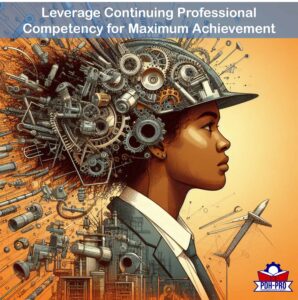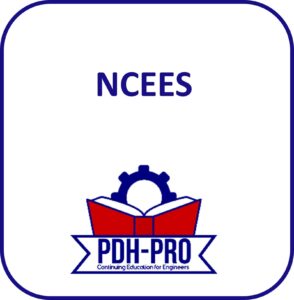Continuing Professional Competency for Engineers
If you are a professional engineer, you no doubt have heard about continuing professional competency (CPC). Because of the magnitude and significant nature of the work of professional engineers, state licensing boards require CPC for license renewal.
Unlike some other professions, engineering is a highly technical field that requires practicing engineers to remain on top of their game in order to produce quality outcomes, regardless of the area of specialization. In fact, as a professional engineer, the health, safety, and welfare of the public depends on you. You must commit yourself to continuous learning so as to build your professional competency to higher levels.
As a professional engineer seeking to have a long-term practice, you can’t avoid continuing your own professional competency. Read on to learn more about CPC and how it relates to professional engineers.
What Is Continuing Professional Competency?
Just like the name suggests, continuing professional competency (CPC) is the on-going improvement of the skills and performance of professional engineers. Every discipline has its own standards of professional competency that practitioners need to follow in order to improve efficiency and effectiveness at their work. For professional engineers, you must demonstrate a certain level of skills, knowledge, and qualities to prove your competence as an engineer in order to satisfy your state board for license renewal.
Your level of competency as a professional engineer has to show continuous improvement. This is what demonstrates your experience and ability to be competitive in your specific discipline of practice. Essentially, continuing professional competency allows engineers to sustain, advance, or expand skills and knowledge in their respective fields. The newly acquired abilities should be relevant, helping you to become a better engineer who practices with the utmost professionalism.
What Is the Difference Between CPC and Continuing Education?
Both CPC and continuing education are important building blocks for professional engineers. Engineers need them not only to increase their knowledge, but also to satisfy state boards for the approval of their licenses. Generally, CPC and continuing education are often used interchangeably to refer to the ongoing requirement for you, as a professional engineer, to upgrade your level of knowledge and skills in your specific discipline. However, there are differences between the two that are worth exploring.
For CPC, a professional engineer engages in activities that aim at sustaining, improving, or developing knowledge and skills. Fundamentally, these activities involve topics or areas that are of interest to an engineer. For example, you can do a presentation on a topic that is of interest to you with the intention of improving professional competency in your engineering practice. On the other hand, continuing education involves taking courses to gain in-depth learning about a particular and relevant area of engineering.
Another major difference between CPC and continuing education is in the issue of state licensing. For continuing professional competency, you need a letter of completion to satisfy your state licensing board. On the other hand, for continuing education, you need to submit transcripts or certificates for licensing approval.
What Is the Difference Between CPC and Professional Development?
The difference between CPC and professional development is that for CPC, continuous improvement of skills and knowledge is a requirement for licensing. Engineers have to continually advance their level of competency in order to keep renewing their license because, as a professional engineer, you can’t practice without an up-do date license. In the same vein, for you to qualify for a license renewal, you have to consistently learn skills and acquire knowledge to retain and improve your practice.
Professional development, on the other hand, might not necessarily involve continuing education and learning as a requirement for licensing. Essentially, an engineer can choose to pursue an area of professional development to increase his skills and knowledge, without the intention of satisfying a state licensing board. Though both are important in improving one’s abilities, they differ in the frequency and aim of the activities related to them.
Engineers also earn continuing education units, which are equal to 10 hours of participation in an accredited program. Many CPC offerings are awarded in CEUs for professional engineers.
CPC Guidelines The National Council of Examiners for Engineering and Surveying (NCEES) gives the following guidelines for continuing professional competency that professional engineers should take note of.
The National Council of Examiners for Engineering and Surveying (NCEES) gives the following guidelines for continuing professional competency that professional engineers should take note of.
- Participating in, and successful completion of, continuing education courses
- Participating in, and successful completion of, courses offered through video, the internet, or correspondence.
- Attending seminars, workshops, professional presentations, and in-house courses
- Giving presentations at seminars, workshops, professional meetings, conferences, and conventions
- Writing and publishing articles, books, and papers
- Being actively involved in professional and technical societies
Benefits of CPC
One of the major benefits of CPC is that it provides a path for your license renewal. You are required to satisfy your state board for license renewal with evidence of having been engaged in professional competency activities. Thus, as you continue to improve your professional capacity, you are able to continue practicing as an engineer.
Another benefit of CPC is that it allows professional engineers to learn new skills and knowledge that are relevant to their areas of engineering practice. As you advance and expand your engineering skills, you are showing your commitment to becoming a better engineering practitioner. Engineering is a technical industry that faces changes in systems and technologies with the aim of creating quality outcomes. Therefore, as you retain and improve your engineering knowledge, you position yourself strategically to becoming a highly competent engineering professional able to navigate through the dynamics of the industry effectively.
Of greater importance still, is the fact that CPC goes a long way in instilling the professional best practices and ethics required in your particular discipline. In this regard, CPC justifies that you have what it takes to safeguard the health, safety, and wellbeing of the public. It is because of the above-mentioned points that CPC remains a pivotal component for professional engineers.
We are an online company that provides continuing education courses for professional engineers. Our staff know the requirements of state licensing boards for renewal of your professional engineering license, and the courses and professional instructors at our company have what it takes to equip you with the right knowledge and skills for your license renewal. Consider partnering with us to bring your professional competency to a higher level.
